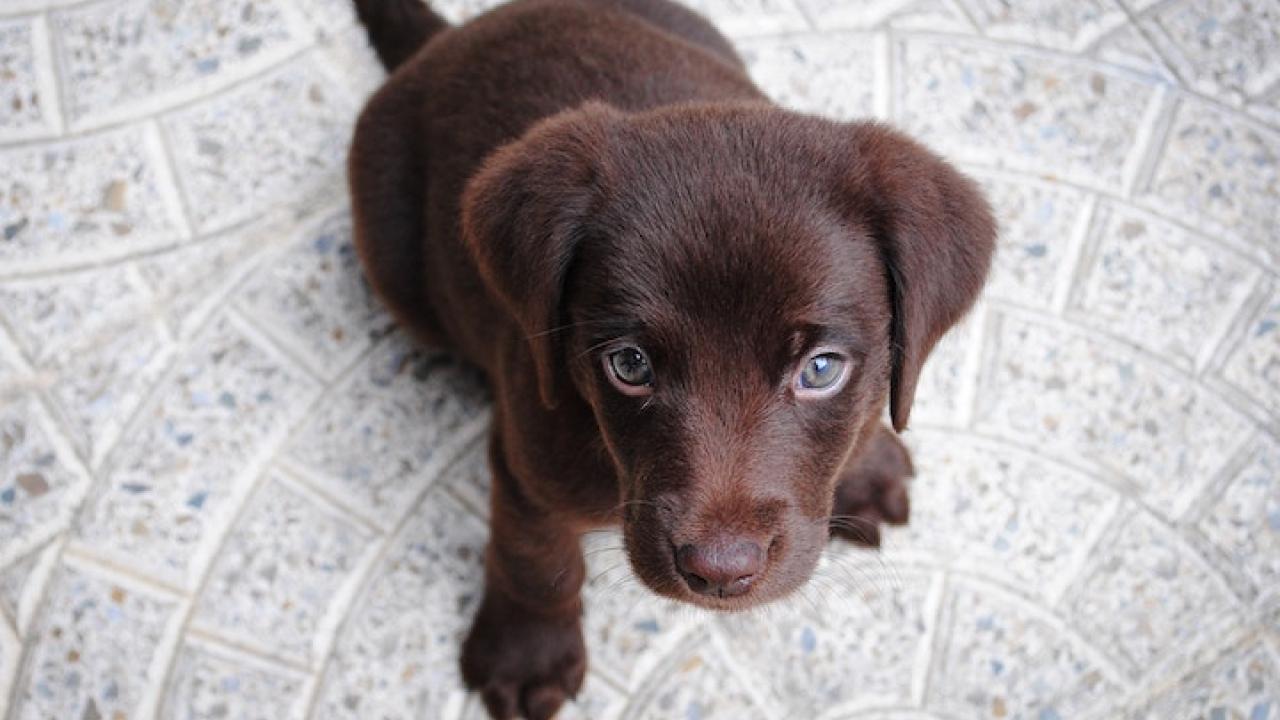
House-Training your Puppy
House-training Your Puppy
How we can help
Call 530-752-1393 to schedule an appointment with the Behavior Service.
It is fun to have a puppy in your house, but it can be challenging, especially when it comes time for housetraining.
Basic Principles of Canine Elimination Behavior:
-
Puppies and dogs are taught by their mothers not to soil their “dens”, and have an innate aversion to doing so.
-
A puppy lacks development of the bladder muscles necessary to hold their urine and feces for long periods of time as adult dogs can.
-
Breeds of dogs may vary in their responsiveness to housetraining. Even though there may be differences in breeds, the same principles of housetraining apply.
What To Do:
When you’re away from home...
-
DO keep the puppy in a small, confined area (e.g. dog crate, bathroom, puppy pen) and make it appealing by providing toys, food, bedding, etc. Your puppy will come to see this as his “den,” which he will prefer not to soil. If you are gone for long periods of time in which your puppy physically cannot hold its bladder, make sure that the area is large enough that the puppy can get away from the mess. An example would be an exercise pen or small room, with the area for elimination set away from its food, water, and resting areas.
-
DO gradually expand the den area until the puppy can be trusted to eliminate appropriately while having access to the entire home.
-
DO remember the number of hours puppies can delay their elimination is strongly linked to their age.
When you’re at home...
-
DO have a schedule for taking your puppy to a designated area to eliminate. For example:
| Age of Puppy | Frequency of Elimination Breaks |
| 6-14 weeks | 8-10 times daily |
| 14-20 weeks | 6-8 times daily |
| 20-30 weeks | 4-6 times daily |
| 30 weeks and older | 3-4 times daily |
-
DO have a feeding schedule in which elimination breaks follow eating and drinking; this is a natural reflex in dogs. Elimination breaks should also follow napping/sleeping and exercise/play.
-
DO praise your puppy at the time he is eliminating in an appropriate place! You can also give him a small treat at that time.
-
DO constantly supervise the puppy to prevent him from sneaking off and eliminating when you can’t correct him; try keeping him on a leash attached to your waist.
-
DO clean inappropriate eliminations thoroughly with enzymatic cleaner to remove residual smells that may entice puppy to revisit the area.
-
DO leave feces in desired areas of elimination, when appropriate, to reinforce that this is an appropriate area for performing this function.
-
DO take the puppy to the same desired area every time; do not play with or excite him until he has eliminated. He should realize that elimination is his first and foremost duty (no pun intended) and that playtime is secondary.
-
DO interrupt improper elimination by startling your puppy (e.g. clapping your hands) and redirect or carry him to the desired elimination area.
-
DO be consistent and patient until your puppy’s housetraining is complete. Incomplete housetraining is a primary cause of housesoiling as an adult dog.
What NOT to do:
-
DO NOT punish your puppy for inappropriate elimination verbally or physically (e.g. hitting with rolled up newspaper, rubbing his nose in his mess, etc). This is ineffective and may lead to further and more serious behavioral problems.
-
DO NOT punish your puppy after you find it.
-
DO NOT leave puppy outside unsupervised. You may miss an opportunity to praise him for appropriate elimination behavior.
-
DO NOT make abrupt changes to your puppy’s diet unless instructed by your veterinarian.
-
DO NOT allow the puppy to have free access to the house without direct supervision. Be especially aware if you think your puppy is going to sleep in the evenings...he may be sneaking off to eliminate.
-
DO NOT get discouraged – accidents will happen and should be expected!
*This article may not be reproduced without the written consent of the UC Davis School of Veterinary Medicine.
